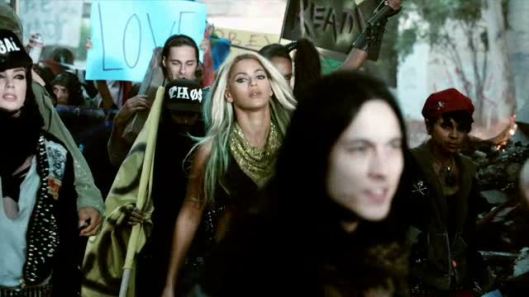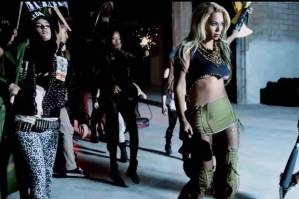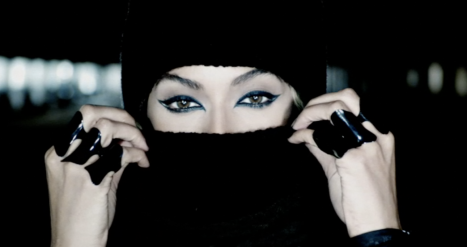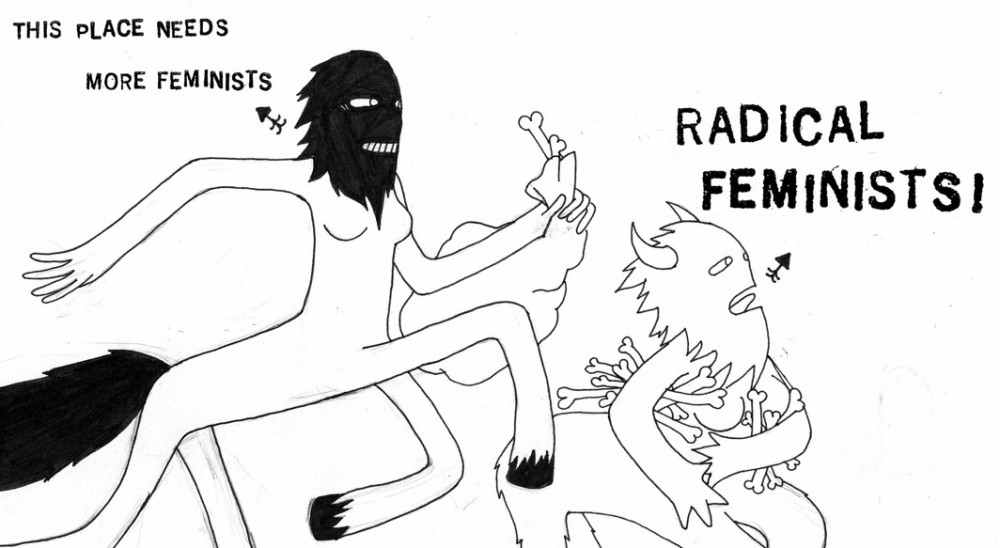 In her December 13th article for The Raw Story, “A Plea: Remember Beyonce’s Record Is Art, Not A Political Treatise”, freelance journalist Amanda Marcotte — who writes on feminism, national politics, and pop culture — tackles the accusation that Beyoncé’s album is “anti-feminist” (referencing reactions to lyrics like “bow down, bitches”) by reminding us that Beyoncé has produced for us a work of art, not one of politics. Because if we look closely, her politics are flawed, or so the argument goes. Marcotte faults Beyoncé for “reinforc[ing] the same beauty standards she decries on the records”, but ultimately concludes that Beyoncé is still a feminist because, you know, feminism is messy. Marcotte ends the piece in (what she claims is) a “plea” that not only fails to understand Beyoncé’s feminism, but also functions to silence the Black radical politics of Beyoncé’s work:
In her December 13th article for The Raw Story, “A Plea: Remember Beyonce’s Record Is Art, Not A Political Treatise”, freelance journalist Amanda Marcotte — who writes on feminism, national politics, and pop culture — tackles the accusation that Beyoncé’s album is “anti-feminist” (referencing reactions to lyrics like “bow down, bitches”) by reminding us that Beyoncé has produced for us a work of art, not one of politics. Because if we look closely, her politics are flawed, or so the argument goes. Marcotte faults Beyoncé for “reinforc[ing] the same beauty standards she decries on the records”, but ultimately concludes that Beyoncé is still a feminist because, you know, feminism is messy. Marcotte ends the piece in (what she claims is) a “plea” that not only fails to understand Beyoncé’s feminism, but also functions to silence the Black radical politics of Beyoncé’s work:
I want to remind everyone that music is not a polemical or a campaign pamphlet. Music is art. Art can—should—be messy, contradictory, raw, and emotional. I love that Beyonce openly struggles in her music and in her image between the push-pull of both wanting to embody this kind of feminized perfection and seeing it for the trap that it is. It’s much more honest and human and humane than some kind of bland feminist treatise set to a beat. Beauty is a painful trap to ensnare women, but beauty is also pleasure and it draws you in. Denying these contradictions and presenting ourselves as people who have it all figured out all the time is tempting, but it’s not honest. And it’s certainly not art, which is supposed to reveal, not conceal. Just a small plea from me to remember that we’re talking about an art form, not a political treatise, as we tear into the lyrics, beats, and imagery that Beyoncé just turbo-launched into the public.
In one short paragraph, Marcotte manages to remind us why white feminism fails (still) to address the experiences of Black women as women; and in the same stroke, disaffects us — as a viewing public — from our identification(s) with Beyoncé as a woman of color. As an ideology, (white) feminism demands that women identify (and rally) as women first, and as bodies of color second, or better yet, last. Marcotte forecloses on the overdeterminacy of Blackness in an anti-Black world, and underestimates Beyoncé’s commitment to (what I am going to suggest here is) an insurgent, Black political future.
 Beyoncé’s radical politics are perhaps best expressed in SUPERPOWER, the music video for a song she sings with Frank Ocean. In it, Beyoncé directs a diverse band of women to commit righteous acts of arson and property damage. Her co-conspirators consist of freaks, monsters and degenerates; she celebrates fearless, violent women: veiled women, Black women, as well as several women who present as gender ambiguous and body dysmorphic. In the last two minutes of the video, these women women are joined by their male comrades and a cadre of Black musicians — Kelly Rowland, Michelle Williams, Luke James, and Pharrell — and together they march to meet the riot police that awaits them.
Beyoncé’s radical politics are perhaps best expressed in SUPERPOWER, the music video for a song she sings with Frank Ocean. In it, Beyoncé directs a diverse band of women to commit righteous acts of arson and property damage. Her co-conspirators consist of freaks, monsters and degenerates; she celebrates fearless, violent women: veiled women, Black women, as well as several women who present as gender ambiguous and body dysmorphic. In the last two minutes of the video, these women women are joined by their male comrades and a cadre of Black musicians — Kelly Rowland, Michelle Williams, Luke James, and Pharrell — and together they march to meet the riot police that awaits them.
The affect produced by this video is telling: the men and women who make up the crowd are wearing baseball caps that read “LEGAL” and (in graffiti) “CHAOS”. Likewise, the beautifully-produced music video is cut with grainy black-and-white camera footage invoking first-hand accounts of a street riot. And the closing scene is haunted by Beyoncé’s lyrical reassurance that, if they stand together, “they [the state] can’t break us down”; as well as an insurgent appropriation of Obama’s 2008 campaign slogan, “Yes, we can!”. Hers is a call for global insurrection on all fronts; and better yet, a violent insurrection with Black musicians at the helm.
 Marcotte is wrong to dismiss the politics of Beyoncé’s music, because it is precisely the political nature of Beyoncé’s art that makes her Black feminism unintelligible to a white audience in the first place. To quote the folks over at The Crunk Feminist Collective,
Marcotte is wrong to dismiss the politics of Beyoncé’s music, because it is precisely the political nature of Beyoncé’s art that makes her Black feminism unintelligible to a white audience in the first place. To quote the folks over at The Crunk Feminist Collective,
Academic feminism ain’t the only kid on the block. …Newsflash – everybody didn’t go to college. So when women of color start waxing eloquent about how our grandmothers and mothers were the first feminists we knew and many of them would “never” use the term, I wonder then why we don’t understand Beyonce’s homegrown brand of feminism – one that honors female friendships, one that recognizes and calls out sexism and domination in her industry, one that celebrates the power of women. No, it ain’t well-articulated radical social justice feminism, but if you need a Ph.D. to be a feminist, then we’ve got bigger problems, folks. AND I’ll take a feminist that knows how to treat her homegirls before one who can spit the finer points of a bell hooks to me all day erry-day.
The differences between “white” (or academic) feminism and “black” (or homegrown) feminism matter: Beyoncé’s politics entertain the dream of an insurgency that might change everyone’s lived conditions; while white feminists are (usually) only interested in agitating for issues that affect them directly. The concerns of mainstream white feminism fail (still) to address the fact that Black women are being gratuitously killed by the state. Or that they are being criminalized, imprisoned, and forcefully separated from their children. Or that their children are being stopped, frisked, and interrogated like criminals and, if need be (or the wind blows in the right direction) shot and killed with impunity. Or that Black women and their families are being starved out by the War on Poverty and the newest bout of rants in Washington about ‘freeloading’ Black welfare queens. Or that Black lives were never worth a damn in the first place.
Beyoncé’s insurgent aesthetics map seamlessly onto the otherwise-soulful, romantic lyrics she offers, suggesting that the music video is intended as a love letter to Black radical insurgency. This metaphor is reinforced by Beyoncé’s love interest in the video — a masked freedom fighter — who she shields from violence with her embrace, but whose face and identity are never revealed.
And I thought the world would move on
I thought the world would move on
Without us, without us, without us
But nothing I know could slow us down
Couldn’t tow us down
…And just like you I can’t be scared; just like you I hope I’m spared. But it’s tough love, I know you feel it in the air; even the babies know it’s there. Tough love. Super power. The laws of the world tell us what goes sky, and what falls; it’s a super power. Super power. The laws of the world never stopped us once, cause together we got plenty super power.
Beyoncé’s music is a political treatise, just not one that Marcotte can understand. The music video for SUPERPOWER concludes with insurgent rebels lunging at the riot police, only to stop dead in their tracks seconds before impact. The video abruptly ends there, before the moment of confrontation between the state and the bodies it has abandoned; leaving us to wonder what will transpire when the mass of bodies Beyoncé has collected actually meet the ruling fist of the state. But perhaps that’s exactly the point: to prod us into thinking about the impossible possibility of a radical confrontation between the state and its people; one in which the odds are always stacked against us, but we persist anyway. (It really is a tough love.) The occult nature of this ending refuses to provide closure to the story of a revolutionary violence that, to borrow from Frantz Fanon, is also a cleansing and a transformative violence; one that will even out the score of anti-Black racism to guarantee Black privilege in an anti-White world.
I have a “plea” for Ms. Marcotte that might rival her own: Beyoncé is not a confused young woman struggling with body and self-image issues that she is working through in her music. She does not need your guidance or patronage in her efforts to come into her own. She’s already IN her own, and perhaps it’s time to entertain the idea that her arrival is what scares you, because — as Beyoncé made clear by the “secret” release of her new album — you can’t anticipate it.
This analysis is written by M. Shadee Malaklou.


I thought I was the only one who recognized that song as a call for revolution and unification of black man and woman!
Pingback: A potpourri of links | Benito Crawford
Pingback: Some worthy links | Benito Crawford
Great article! Superpower’s video was one of my favorites and I’m glad to see that others agree that it seems to be a call for revolution.
I do have one comment though, that you might be interested in discussing. In your reference to Fanon, you seem to be invoking Sartre’s reading of “On Violence” with words like “transformative” and “cleansing.” Fanon himself viewed violence as necessary within that colonial situation, but deemed it harmful for the colonized psyche, too. Sartre, on the other hand, romanticized violence in the same way you seem to be, which he was able to do from a very privileged position of one who was not “living in death.” Furthermore, racial oppression is now very aesthetic, and so it is debatable whether violence is still a necessity in the path to complete decolonization, in the way Fanon argues it. Of course, the violence black bodies receive on a daily basis does deserve full attention. I’m just trying to raise the issue that the contemporary situation is not so simple that a violent meeting won by the people will necessarily reverse years of racial oppression.
That said, again, I thought your article was excellent 🙂 Based on the context of your reference, I believe your point there was much more nuanced than my over-simplification of it, so I was hoping you could perhaps elaborate. Thanks!
Thank you for this detailed comment!! You are *spot on*. I’m definitely reading Fanon through Satre (and through anti-colonial scholarship more generally); specifically, Sartre’s 1961 preface to Fanon’s Wretched of the Earth. But I’m also reading Fanon through Frank Wilderson’s work; most notably Wilderson’s observations in “Gramsci’s Black Marx” that a revolution in civil society — like the kind offered by nonviolent resistance — won’t actually change the lived conditions of black folk who are “living in death” (to borrow from you).
I think it could also be argued that I’m reading Fanon through, well, Fanon; in Wretched of the Earth Fanon claims that colonial violence and anti-colonial violence are markedly different, the latter being a legitimate means of political liberation (and perhaps even the only means of liberation). You may want to check out the “What’s Afro-pessimism got to do with it?” page of my blog, wherein I detail the need to read Fanon the anti-colonialist (Wretched) alongside Fanon the black radical thinker (Black Skin, White Masks). My interpretation of Beyonce’s music video is very much inflected by my academic research more generally, which attempts to reconcile Fanon’s many different political interests by reading his insights through queer theorists of color, Afro-pessimists, metaphysicists like Hegel and Heidegger (or rather, reading Hegel and Heidegger through Fanon), and post-colonial/anti-colonial thinkers like Satre and Edward Said; in an attempt to work through some of the same contradictions that you so beautifully outline in your comment.
I’m so glad you liked the article! Thank you for taking the time to engage with it on a theoretical level. I hope that you will spend some time perusing the other pages/posts on this blog (you may want to check out an article I wrote on the petition to quantify Kanye West’s I.Q., or the one I wrote about Janelle Monae’s radical politics in her music video for Q.U.E.E.N.).
Warm regards,
Shadee
Thanks for the response! Honestly, I’m just a young college student, so I don’t have much theory to draw on so far. I’m very grateful for your references and suggestions though, and I’ll be sure to read through them. Thanks for your time 🙂
Um, last I checked white conservative christians in America have stockpiles of guns and ammo. Then many have cellars with food for a year. Many in this group are actively praying for Armageddon. Study revolutions…. The people that can overpower and outlast will win. Now on to a revolution we can win? How about yanking those damn extensions outta the hair? How many billions do we black women spend on hair? 6? 11? what are the minutes a dollar stays in the black community? like 5 or 6 minutes versus a 17 days to a month for other ethnic/race groups. How about not spending money on fast food or disposable fashion? A real bloody revolution means rations of beans and rice if you are lucky, it means the same filthy clothes all the time, it means broken glasses and no contacts, it means UTI’s and chronic infections, it means decayed teeth you can’t get fixed. IT MEANS BLOODBATH people! It does not mean walking in heels with celebrities and fashion that H&M is peddling. The police have sonic weapons that make you shit your pants, that burst your eardrums, that boil your body and people really think Beyonce and the rest of the damn celebrities are going to be with you treating your gangrene when you can’t even leave you house because bombs are flying? People get real. Start the real revolution … Stop buying corporate shit…. Not more fast food, fast fashion, and simple solutions. And lets support a sexy bombshell of a woman who actually isn’t afraid to rock her own kinky hair. I’m over it. But it’s about supporting and being the change I want in this world not giving more energy to the icons who propagate an outmoded worldview that doesn’t serve us but leads us to slaughter.
“black” = homegrown and “white” = academic?
Great idea, let’s fight structural racism with…structural racism. With privileged allies like this stirring the pot, who needs white supremacists?
Pingback: A Tough Love: “Beyoncé,” Mutuality, and the Dirty South | hiphopocracy
Thanks for this post!
In the opening when Beyonce was wearing knit mask with her eyes thickly lined, it so reminded me of an image of the terrifying shrouded exotic muslim woman. Then as the camera pans below, we see the shrouded one does not seek white feminist liberation, but rather anonymity and beauty. I took this as yet another reference to alliances across bodies and spaces.
Pingback: BLOG UPDATE: jFc blog gets a (mini) makeover, because mama’s got shit to do | JESUS FUCKING CHRIST.
Pingback: Beyoncé Slays Black People | Orchestrated Pulse
Hi I know this post is pretty old hopefully your still active with but I do have a comment after reading your article I totally agree and appreciate you writing this article but…. Now is it me am I being toxic and judgemental? I’m of the African diaspora and I love everything Beyoncé and Jay do when it comes to activism but the whole video she looked like she was in white face and idk if that was the trend at the time or whatever but it muddles the message for me as a feminist of African decent I’m watching d
her video catalog and I’m noticing a trend it starts with “haunted ” I’m like why so light 💡 and then I’m like ok she’s a ghostly figure I’ll let it slide then “dance for you” come on she is completely mayo crappy wig and seducing a white male figure why ? Then “ work it out “ not part of this album I’m speaking of but I. Like what wrong with is Beyoncé why did she have to vanilla herself for these politically geared videos another vanilla example “ Bow Down” it’s punk culture (which some artsy and Afro/pop culture freaks would say blacks created idk) and mostly white ppl in the shot now she does give a subliminal once you transition to flawless she has both hands palm down on to punks who are white and seen that as a strong message but why lighten your skin so much for this album she is skinnier her noes is overly contour to look super thin she already has a small nose her lips even look thinner i just want to know if I’m being a jerk or not bc I love the messages but I can still see how some people maybe confused but her stance